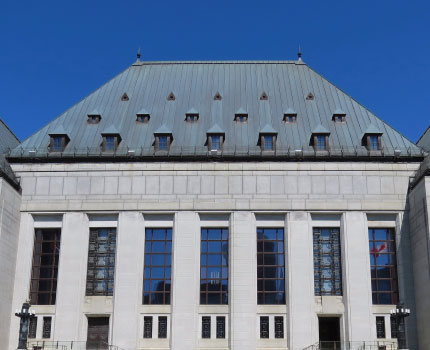On behalf of Edelson Clifford D’Angelo Friedman LLP posted in Criminal Defence on August 10, 2016.
On February 6, 2015, the Supreme Court of Canada, in a landmark unanimous decision, declared that “prohibition on physician-assisted dying infringes the right to life, liberty and security of the person in a manner that is not in accordance with the principles of fundamental justice.”[1] The case of Carter v. Canada, was a drastic shift from the Courts previous ruling in Rodriguez v. British Columbia, which upheld the constitutionality of s. 241 (b) of the Criminal Code.[2] Section 241 (b) states that it is a crime to aid and abet a person to commit suicide and s. 14, states that a person cannot consent to die. These provisions worked together to make physician assisted suicide a crime in Canada.[3]
The Court stated that the matrix of the law and the facts in this case were much different than they were in Rodriguez. The Court found that the outright prohibition of physician assisted suicide was overbroad, infringing s. 7 of the Charter and violating the principles of fundamental justice. The ban was also not proportional to the objective it was serving, namely to protect vulnerable people from taking their lives in times of weakness. This means that the Charter infringement could not be saved by the reasonable limits clause in s. 1 of the Charter.
The Court declared that s. 214 (b) and s. 14 of the Criminal Code were of no force or effect. The law could not prohibit physician assisted suicide if the person was a clearly competent adult, who had a grievous and irremediable medical condition that causes intolerable suffering and had given their consent to die.[4] While the Court declared the legislation invalid, it suspended the decision from taking place for 12 months to allow Parliament to introduce new legislation.[5]
In January of 2016, the Supreme Court granted the government a four month extension, giving the government until June 6, 2016, to pass new laws. While drafting the new legislation, Parliament had to balance the social interest of those who seek medical assistance in dying with the task of safeguarding vulnerable members of society.
On June 17, 2016, Bill C-14, the proposed bill for physician assisted suicide, became law. The new legislation defined what medical assistance in dying means and added exceptions to the Criminal Code for medical assistants who aid a patient in dying.
The new legislation also describe who is eligible for the medical assistance in dying exception. Section 241.1 (1) states that to receive medical assistance in dying, a person must be eligible to receive health services in Canada; are at least 18 years old with the capacity to make health care decisions; they have to have been given informed consent; the decision would have to be voluntary and non-coerced; and they have to have a “grievous and irremediable medical condition”.
Justice Minister Jody Wilson-Raybould, has stated that “the legislation strikes the right balance between personal autonomy for those seeking access to medically assisted dying and protecting the vulnerable.”[6] While some agree with the Minister’s statement, many believe that the legislation is too restrictive. In particular, the definition of “grievous and irremediable medical condition” has received the most scrutiny. According to the new legislation, to qualify as a “grievous and irremediable medical condition”, a person must be in the advance stages of a serious and incurable illness, disease or disability that has caused an irreversible decline in capability. Additionally, this state of decline must be causing enduring physical or psychological suffering that is intolerable, cannot be relieved, and the natural death of the individual has become reasonably foreseeable.
Critics have argued that limiting the law to only terminal illnesses where natural death is reasonably foreseeable is unwarranted. This legislation is predicted to prevent Canadian suffering from an intolerable, but non-terminal medical condition, from accessing any medical assistance in dying. [7] To illustrate this argument, critics have stated that Kathleen Carter, whose family brought the case forward and won, would still not be able to access physician assisted suicide, because while her physical condition was deteriorating, her illness, spinal stenosis, was not life threatening.
These limitations have led many to believe that this legislation will be challenged. Some senators have described the reasonable foreseeable death provision as a “fatal flaw” and many others believe the new laws do not comply with the Carter decision or the Charter.[8] For example, the fact that the legislation restricts access to people whose deaths are reasonably foreseeable can be argued to violate both s. 7 and s. 15(1) of the Charter, as it may infringe on a person’s life, liberty and security of person and it discriminates based on disability. The argument is that, a person who is suffering intolerably but their particular disease is non-terminal, will be treated differently from those whose disease is terminal or where death is reasonably foreseeable.
Senator Mike Duffy may have said it best when he stated that the new legislation is a “Canadian compromise”.[9] While the courts have not dealt with this new legislation yet, it may not be long before patient advocate groups, like the British Columbia Civil Liberties Association, test the constitutionality of this compromise on behalf of people who have non-terminal illnesses.
[1] Carter v. Canada (Attorney General), 2015 SCC 5, at para 56 & headnote [Carter].
[2] Rodriguez v. British Columbia (Attorney General), [1993] 3 SCR 519.
[3] Carter, supra note 1 at para 20.
[4] Ibid at para 4.
[5] Ibid at para 128.
[6] The Canadian Press, “Assisted Dying Bill C-14 Passes Senate With Liberals’ Restrictive Approach” The Huffington Post (17 June 2016) online: Huffington Post <http://www.huffingtonpost.ca> [CP].
[7] Catherine Tunney, “Liberals’ assisted-dying bill is now law after clearing final hurdles” CBC NEWS (17 June 2016) online: CBC News < http://www.cbc.ca> [CBC]; Carter, supra note 1 at para 17.
[8] CP, supra note 6.
[9] CBC supra note 7.

